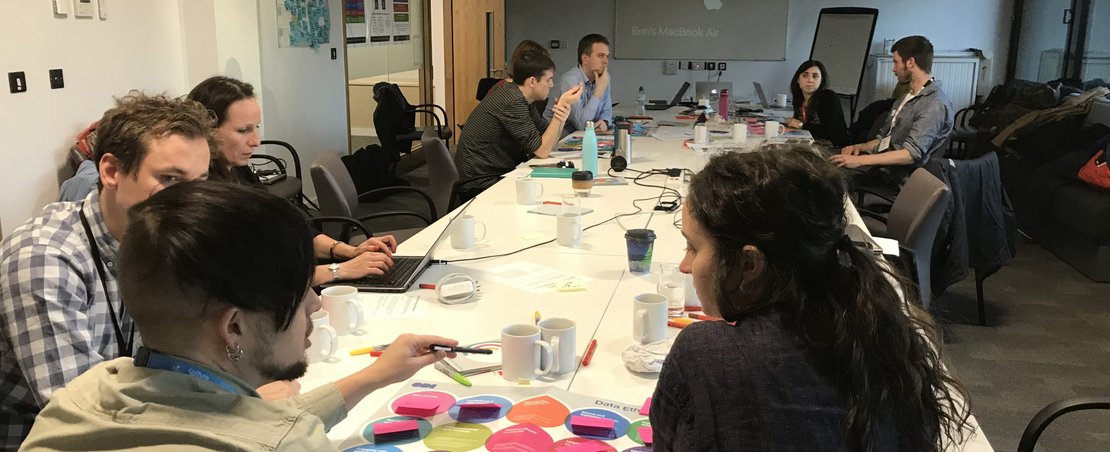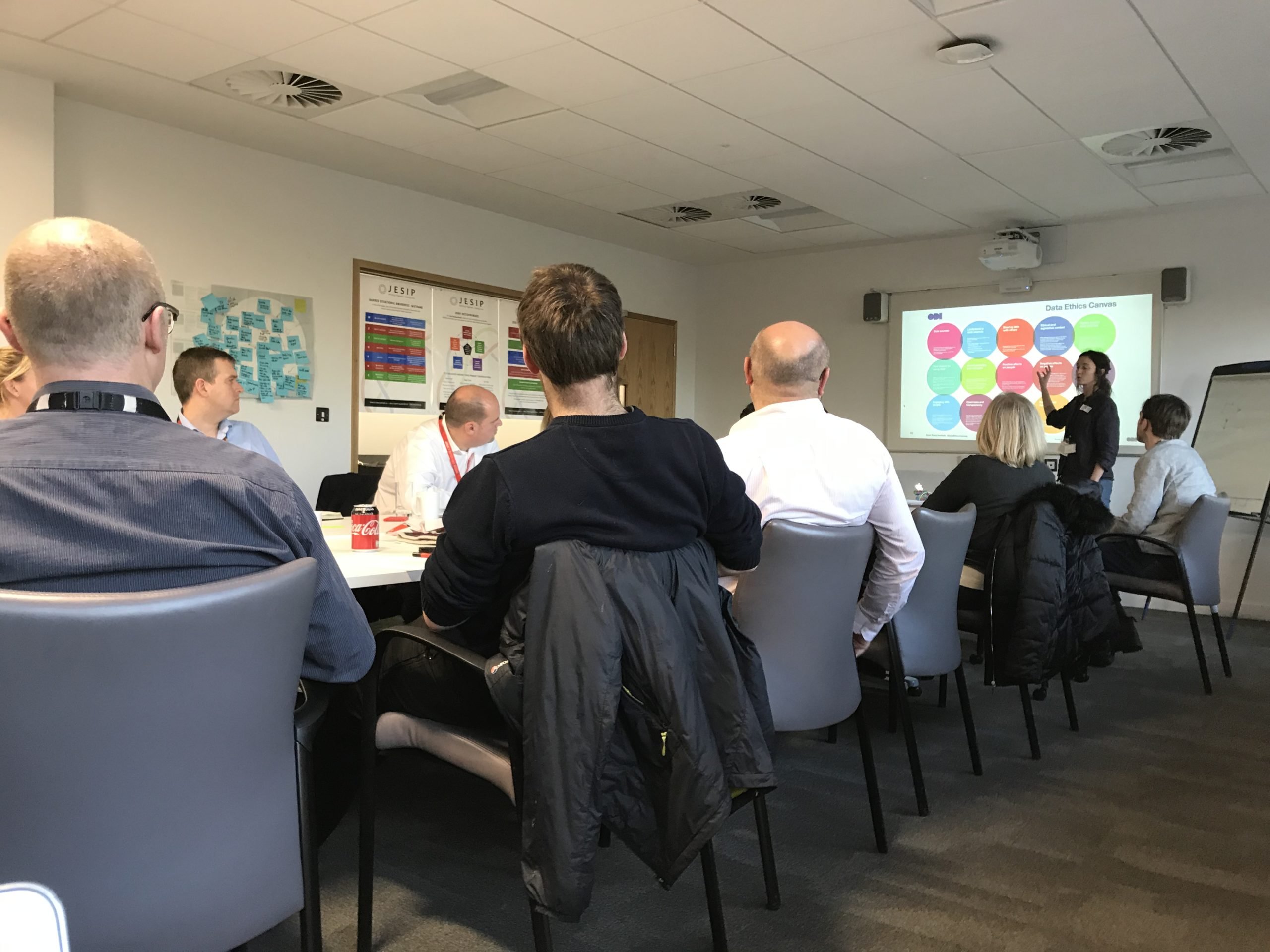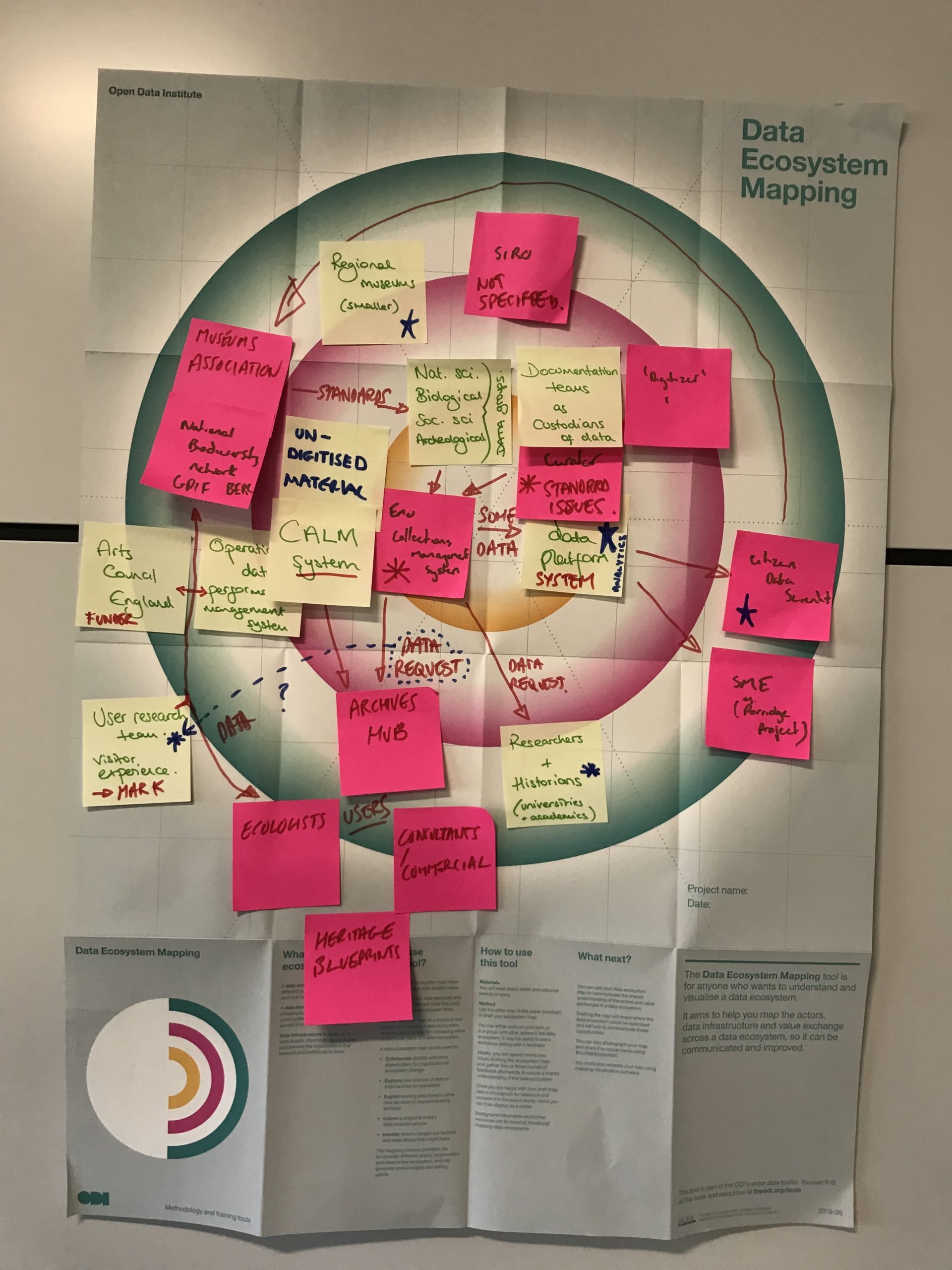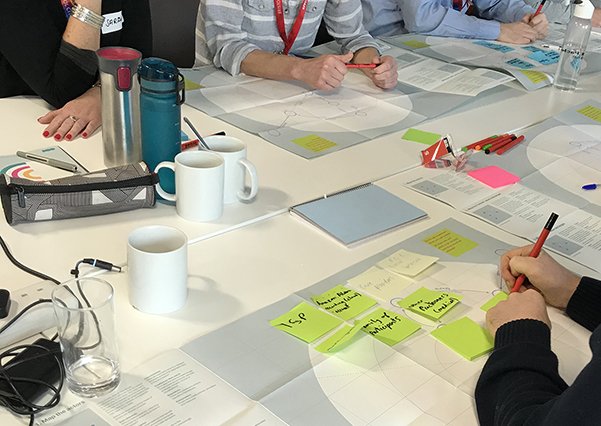
Get in contact to book a cities workshop
Contact us if you would like us to run a cities workshop with your team, or if you would like more information about any of our training sessions.
We worked with Bristol Connected City to test out our cities workshop and training offering – which uses our Data Ecosystem Mapping and Data Ethics Canvas tools – to help cities understand, map and establish how effective use of data can benefit the city
In the world of pop, a city can be ‘built on rock and roll’; in reality cities are built on a mixture of solid ground and data. In fact, data infrastructure is increasingly becoming one of the critical foundations of a city’s decision making.
But how do cities demonstrate they have solid data foundations on which to build? And how do those working in the complex city environment ensure they have a grasp on the data flow between departments, organisations, or local authorities and citizens?

These were some of the initial questions we posed to ourselves as part of our R&D Open Cities project during the course of 2019. We wondered, do cities know what data they have? Do they understand the value of the data they have? Are they making the most of what they already have before asking for more? Can they map their data ecosystem to help them answer these questions?
From our initial research we discovered that trying to understand the data ecosystem of a city – ie the flow of data – is incredibly complex. Even understanding the different elements – such as local authorities, universities, businesses, citizen groups, startups or charities that make up a ‘city’, can vary. This became abundantly clear when we started to try and understand the different structures for local governance and the impact of devolution.
We initially sought to answer these questions by using desk research to understand the maturity of the use of data, open data and technology across UK cities. While desk research opened up many areas of knowledge, we realised that we often failed to get a clear picture of each cities ecosystem – or data landscape. We found that using tools created by the ODI – most notably the Data Ecosystem Mapping tool – was helpful in outlining the different elements that make up many of the complex city ecosystems, for example the various departments and relationships where data is or isn’t collected, used and shared.
The ODI tools
A fundamental part of the work we do at the ODI is to create tools to help people and organisations work better with data.
These tools include:
- Data Ecosystem Mapping tool and workshop activity
- Data Ethics Canvas
- Data and Public Services Business Case Canvas
All of the tools are available on our website.

These tools cover a range of different considerations required to ensure improve or embed good use of data practice.
Data Ecosystem Mapping helps establish data flow across a project, organisation, network etc. For cities, as mentioned, we found it can help identify actors, relationships, where data is and isn’t flowing and where there could be improved opportunities. The mapping process can help make complex ecosystems more visual and therefore easier to understand.
The Data Ethics Canvas is a tool which can be used to help identify potential ethical issues that a project, idea, activity or application might have. It helps focus people and teams to ask questions about use of data which may not immediately spring to mind.
The Data and Public Services Business Case Canvas can help the design and delivery of public services by identifying data and evidence of value of data which can be used to improve and establish new services.
We initially used the Data Ecosystem Mapping tool to help us understand cities better, but as we dug further into the complex nature of cities and the wide range of projects and applications being built into city spaces under the guise of ‘smart’, we felt that the Data Ethics Canvas would also bring value to project teams to help them ask and then test difficult and challenging ethical questions around the use of both personal and non-personal data.
This could potentially help cities prevent unnecessary data breaches, poor data management or behaviour, while embedding trusted and ethical processes right from the start. In turn the Data and Public Services Business Case Canvas could help convert the learnings and ideas from the ecosystem and ethics elements of the toolkit into new or improved services.
Planning
The ODI tools have been designed for anyone and everyone to use, but we saw an opportunity to test them within cities specifically. We felt that the insights that could be gained from creating a workshop and learning day using these tools could bring value in advancing the idea of open rather than smart within city decision making.
The ODI policy lead and researcher within the Open Cities project team worked with the training and delivery teams to develop a workshop and ethics learning session.
Concurrent to the internal development and design planning, the cities team had a chance meeting with Marius Jennings from Bristol City Council who expressed an interest in being a guinea pig for us.
Bristol, due to its long-held focus on innovation, technology and data, was an ideal candidate for us to test our workshop with. The Connecting Bristol strategy launched in 2019, emphasised the desire of Bristol to become the UK’s most digitally connected city by 2025 by strengthening ‘the city’s digital foundations so that it becomes well-connected and better placed to deliver technological innovation’.
The strategy outlines a city-wide approach to innovation by including a wide ecosystem of actors – involving the City Innovation Team, Bristol is Open, the Council IT Service, the Operations Centre and the council itself all housed under the umbrella of Bristol ‘Connected City’.
We outlined the framework of the workshop to Marius, explaining that it would be a hybrid day of training and workshop, and that there would be an opportunity for participants to use the day to work on specific projects taking place within Bristol Connected City.
Marius worked closely with us to help us understand some of the challenges and opportunities the teams in Bristol were experiencing. Marius also worked hard to ensure that a wide range of people from across many different departments were invited.
The workshop
The workshop took place in Bristol in December 2019. It was attended over the course of the day by 20 people. Attendees joined us from: Bristol City Council including Bristol Waste, Bristol Culture, and the City Innovation team; Avon and Somerset Police; Bristol is Open and external contractors working within the Connected City.
We used the following resources:
- Data Ecosystem Mapping tool and workshop activity
- Data Ethics Canvas (this was presented as a shortened version of the Data Ethics Training)
- Data and Public Services Business Case Canvas
What happened and what we learned
Following an introduction to the ODI and a short opportunity to get to know each other, the ODI team introduced The Data Ecosystem Mapping tool. The aim of this session was to demonstrate how the tool can be used to visualise not just a city’s open data ecosystem, but can help understand which departments and organisations are involved, and how data and insight is shared between them. We asked the group to get into smaller groups and map a project or a department themselves.
We asked the individual teams to present their maps to the room. As expected a good understanding of where data is held and who the key actors are within the departments the groups chose to map was demonstrated. However taking the time to think more widely about the bigger ecosystem that these known elements fit within enabled each team to demonstrate consideration of the often unconsidered relationships, data flows, data blockages and opportunities that are not immediately obvious in their day to day approach.
We witnessed new angles and approaches to build relationships being taken. Furthermore we heard of opportunities for data to be made more open, to be shared more widely or to help identify areas for funding opportunities.
Specific points which were highlighted in the presentation of the maps included:
- The changing nature of conversations regarding centralising services or data dashboards.
- The importance of building good relationships
- The importance of anonymisation
- Identifying opportunities to develop clear standards for data collection and use across different departments, to enable data requests to be handled more efficiently.
- Identifying the need to obtain consent for personal data.
- Consideration as to whether access to more data was necessary or could existing data and a qualitative survey provide the required data without the need for a more intrusive approach.
- Identifying the amount of times a department engaged with different actors and how building on those engagements could be improved.
- Opportunities to improve departmental efficiency were identified.
- Opportunities for using technology to improve data flows were established.
- Identifying departmental data that could be shared or made open such as data on demographics and age.
- Blockages were identified between various different departments, and the reasons for them were discussed and established.
Introduction to Data Ethics and the Data Ethics Canvas training equipped participants to apply the data ethics canvas to help them evaluate the next steps in a project.
We explored the differences between ethics and moral decisions by introducing dilemmas posed when considering how an autonomous vehicle should be programmed to behave/react in given a potential scenario. The discussions focused on exploring the differences in ethics depending on culture and societal values, and the impact these decisions can have on designing and building technology that is uniform and globalised to meet everyone’s demands ‘equally’.
We then compared the relationship between ethics and law where participants were asked to consider the ethics of customer behavioral data that is collected and shared by a car insurance company that uses the data to make decisions about insurance rates. Participants challenged the outputs from the machine learning system, and provided their own perspectives as to what could have been done differently if ethics were considered when collecting, sharing, and using data. A key outcome of this discussion is that participants were able to address concerns for how modern services are built and challenged these approaches by raising the importance to think of the adverse impacts of using data unethically.
The last part of the workshop gave participants the opportunity to work on a project they are currently involved in and use the Data Ethics Canvas as a framework to assess the ethical considerations of how their project or service is designed. The training offered to this point was a stimulating introduction before delving into the application of the canvas.
Marius had informed us that there were projects of significant relevance to Bristol City Council which may pose interesting ethical questions. We introduced these as potential use cases for participants to explore if they chose, alternatively they were welcome to explore a project or idea they were currently working on.
Participants were split into four groups, each group discussing the project of their choice, some used the project they explored during the data ecosystem mapping session.
The groups took roughly an hour to discuss the various elements of the ethics canvas. The following are interesting questions the groups posed:
- How to phrase questions that require only yes/no answers to restrict the amount of identification of people which would not be relevant.
- How to be more transparent about how the data will be used.
- Reassurance that current practice meets data protection regulation.
- How using only open data has ensured that the process isn’t reliant on personal data which might tempt misuse or could harm vulnerable people.
- A need to interrogate security of data going forward.
- Discussion about involving academia in order to give reassurance and confidence about how data will be used to emphasise that data would not be used for commercial purposes.
- Importance of consent and control for the citizen.
- Discussion about advancing training and teaching digital skills to more people to help them use tools.
Overall we were told that the session had not only provided wider conversation and debate but that it had increased confidence in the status of projects, knowledge and thinking. The Data Ethics Canvas itself was useful as a checklist of things to think about and interrogate at the start of a project or as it advances.
The ODI team then gave a brief overview of the Data and Public Service Business Case Canvas. The business case canvas was developed by the ODI off the back of user research in local authorities which highlighted the struggle of public sector employees to get projects approved by higher management. It lays out a framework to help people communicate and advocate for projects they consider should be implemented.
With the learnings of the day in mind, we explained how the outputs from the day had covered some of the critical elements needed to develop a data business case, for example:
- the purpose and added benefit of using
- collecting or sharing data
- the positive and adverse impact of this project or service
- identify the stakeholders involved and their role and value added to the project or service; and articulate openly and transparently the decisions made to create and deliver it.

Testimonials
We are pleased to share some of the feedback we received from participants of the day. The feedback we are sharing was given to us with consent to share.
“The data ethics and morals session was highly thought provoking and linked to a ODI data ethics canvas which is a genuinely useful tool.”
“The ODI provided some compelling training on key aspects of open data and really helped me understand the ethical dimensions of project planning for data intensive projects.”
“The ODI provides a range of powerful tool that makes having a discussion on data with stakeholders easier.”
“The tools provided have offered us a way to navigate through the data challenges we face as an organisation and champion data issues amongst colleagues”
“Really enjoyable and useful learning experience with subject matter experts”
Next steps
We are enormously grateful to have had the chance to test our workshop/training offering with a city as welcoming and engaged as Bristol, and for Marius's blogpost on the Bristol Connected City site.
Working with them allowed us to see that our tools and training can benefit cities in a range of ways. Whether it’s understanding the wider landscape, understanding and identifying areas of improvement or opportunity, or testing and challenging outcomes of ideas, projects and applications based on ethical considerations.
Internally we identified a greater opportunity for collaboration between policy, research and development and the training teams to work together to co-create workshops and training sessions that are accessible, interactive, and which address some of the data literacy skills needed when working with data.
Since running the workshop we have been tweaking and fine tuning the offering with the intention of iterating the experience during 2020.
Get in contact
If you are interested in learning more about this work and our cities project as a whole please get in touch with the team.
If you would be interested in us holding a cities workshop or any of our training sessions please contact our business development team.